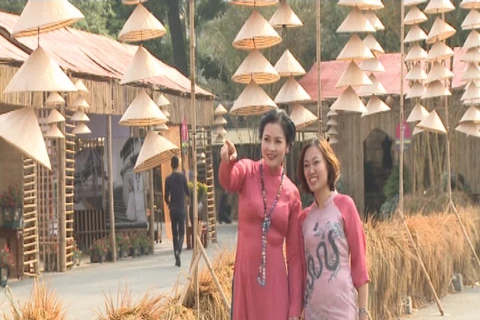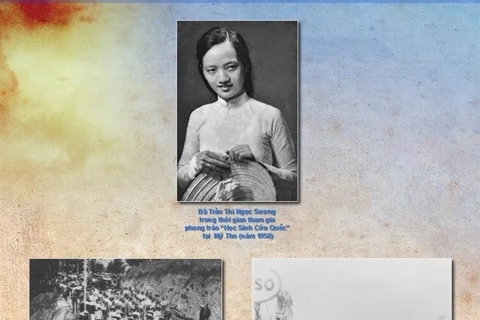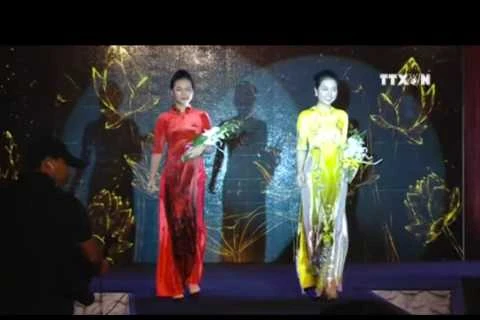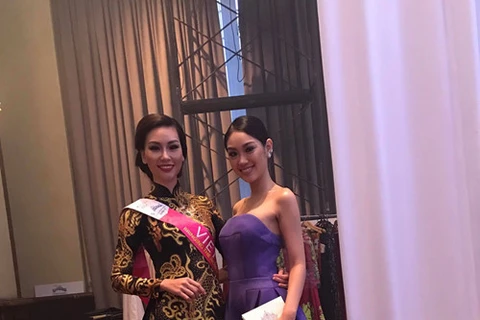Hanoi (VNA) - Artists and cultural groups are working to encourage Vietnamese men to wear ao dai, the famous Vietnamese traditional long dress.
“This year, both women and men are wearing ao dai in our annual events,” researcher Nguyen Duc Binh told the Viet Nam News.
A few days ago, Binh led a group of 50 people, mostly members of Dinh Lang Viet (Vietnamese Communal House) organisation, to gather at the So Village Communal House, nearly 20km west of Hanoi’s centre, to make a video clip on communal housing values.
“Ambassador Pham Sanh Chau, the Foreign Minister’s Assistant, initiated the idea and joined our clip,” Binh said. The video is part of a broader campaign to keep traditional dress and values alive.
In HCM City, Dai Viet Co Phong, a group specialising in ancient Vietnamese culture, is offering an ao dai tailoring service.
Some enterprises in the city have contracted the group to make ao dai for staff uniforms.
Recently, ao dai have been popular among male singers as well.
“I received lots of encouragement from the Republic of Korea's audience when I wore a traditional long dress for a man,” singer Han Thai Tu told Thanh Nien (Young People) newspaper after he returned from his recent trip to the Republic of Korea.
Singer Duc Tuan, who always wears simple decorated long dress, confirmed: “This Tet, I will wear ao dai to perform at music shows.”
Ao dai designer Sy Hoang guessed this lunar new year, more men will wear ao dai when visiting Nguyen Hue Flower Street.
“I always encourage my friends in Sai Gon Businessmen’s Club to wear ao dai,” he said.
Vi Kien Thanh, head of Fine Arts, Photography and Exhibition Department of culture ministry, called traditional ao dai an elegant costume.
“The only obstacle for men to wear the costume is their awareness,” he said, “Many people think that ao dai for men associates with khan xep [a kind of head gear like turban]. If modern men wear such costume, it symbolises a return to backward feudalism. They also worry that it doesn’t suit active life. Yet I think if we just wear on holiday, it will be fine. It’s comfortable and elegant.”
In recent years, there have been many modern ao dai designs for women, like the ones with shorter length, shorter sleeves, without sleeves or in varied materials. Women even wear ao dai with jeans instead of loose silk pants.
People tend to be more cautious with ao dai for men.
Researcher Nguyen Dong holds that modern designs of ao dai for men was not comfortable to wear, as they were tight, not easy for movement, and sometimes looked like Chinese and Indian costumes.
“Ancient Vietnamese ao dai consists of five parts, while Chinese and Indian consist of six parts,” he said, “Five parts in the traditional long dress symbolise the wearer’s parents, his/her spouse’ parents and him/herself.”
“Standard ancient ao dai is comfortable; silk is cool in summer and warm in winter,” Dong said.
In the meantime, many designers opt to change traditional designs to suit modern life.
Nguyen Thu Ha, who specialises in costume for historical films, published her guidelines to choose materials and tailor ao dai for men.
According to her, there are three layers of an ao dai costume for a man. The innermost is a shirt, which is made of soft cloth, designed with two pockets for money and mobile phone.
The next costume is an inner ao dai in white soft cloth. The outer ao dai is designed following the wearer’s interest in colour and textile.
“Men can wear the set with European pants and shoes,” Ha said, “Noted writer Vu Trong Phung (1912-1939) used to wear that way.”
Concerning materials, Ha said beside traditional cloth like velvet, cotton, satin and embroidered silk, today’s ao dai can be tailored from modern industrial cloths.
“Ao dai for men should be made from thick, hard cloth like the one for tailoring European vest and pants,” she said.
Designer Thuan Viet aims for younger men with cotton, linen materials to cut shorter ao dai.
Male model Ngoc Tinh, who has recently appeared in public in ao dai , said: “I would like to launch a movement of wearing ao dai among both women and men during traditional holiday.”
“Just imagine, on the first day of lunar new year, all family members wearing ao dai reuniting to wish others good luck and pose for photos. It’s so meaningful! Whether they wear modern or original traditional long dress, it’s a beauty in Vietnamese culture.”-VNA
“This year, both women and men are wearing ao dai in our annual events,” researcher Nguyen Duc Binh told the Viet Nam News.
A few days ago, Binh led a group of 50 people, mostly members of Dinh Lang Viet (Vietnamese Communal House) organisation, to gather at the So Village Communal House, nearly 20km west of Hanoi’s centre, to make a video clip on communal housing values.
“Ambassador Pham Sanh Chau, the Foreign Minister’s Assistant, initiated the idea and joined our clip,” Binh said. The video is part of a broader campaign to keep traditional dress and values alive.
In HCM City, Dai Viet Co Phong, a group specialising in ancient Vietnamese culture, is offering an ao dai tailoring service.
Some enterprises in the city have contracted the group to make ao dai for staff uniforms.
Recently, ao dai have been popular among male singers as well.
“I received lots of encouragement from the Republic of Korea's audience when I wore a traditional long dress for a man,” singer Han Thai Tu told Thanh Nien (Young People) newspaper after he returned from his recent trip to the Republic of Korea.
Singer Duc Tuan, who always wears simple decorated long dress, confirmed: “This Tet, I will wear ao dai to perform at music shows.”
Ao dai designer Sy Hoang guessed this lunar new year, more men will wear ao dai when visiting Nguyen Hue Flower Street.
“I always encourage my friends in Sai Gon Businessmen’s Club to wear ao dai,” he said.
Vi Kien Thanh, head of Fine Arts, Photography and Exhibition Department of culture ministry, called traditional ao dai an elegant costume.
“The only obstacle for men to wear the costume is their awareness,” he said, “Many people think that ao dai for men associates with khan xep [a kind of head gear like turban]. If modern men wear such costume, it symbolises a return to backward feudalism. They also worry that it doesn’t suit active life. Yet I think if we just wear on holiday, it will be fine. It’s comfortable and elegant.”
In recent years, there have been many modern ao dai designs for women, like the ones with shorter length, shorter sleeves, without sleeves or in varied materials. Women even wear ao dai with jeans instead of loose silk pants.
People tend to be more cautious with ao dai for men.
Researcher Nguyen Dong holds that modern designs of ao dai for men was not comfortable to wear, as they were tight, not easy for movement, and sometimes looked like Chinese and Indian costumes.
“Ancient Vietnamese ao dai consists of five parts, while Chinese and Indian consist of six parts,” he said, “Five parts in the traditional long dress symbolise the wearer’s parents, his/her spouse’ parents and him/herself.”
“Standard ancient ao dai is comfortable; silk is cool in summer and warm in winter,” Dong said.
In the meantime, many designers opt to change traditional designs to suit modern life.
Nguyen Thu Ha, who specialises in costume for historical films, published her guidelines to choose materials and tailor ao dai for men.
According to her, there are three layers of an ao dai costume for a man. The innermost is a shirt, which is made of soft cloth, designed with two pockets for money and mobile phone.
The next costume is an inner ao dai in white soft cloth. The outer ao dai is designed following the wearer’s interest in colour and textile.
“Men can wear the set with European pants and shoes,” Ha said, “Noted writer Vu Trong Phung (1912-1939) used to wear that way.”
Concerning materials, Ha said beside traditional cloth like velvet, cotton, satin and embroidered silk, today’s ao dai can be tailored from modern industrial cloths.
“Ao dai for men should be made from thick, hard cloth like the one for tailoring European vest and pants,” she said.
Designer Thuan Viet aims for younger men with cotton, linen materials to cut shorter ao dai.
Male model Ngoc Tinh, who has recently appeared in public in ao dai , said: “I would like to launch a movement of wearing ao dai among both women and men during traditional holiday.”
“Just imagine, on the first day of lunar new year, all family members wearing ao dai reuniting to wish others good luck and pose for photos. It’s so meaningful! Whether they wear modern or original traditional long dress, it’s a beauty in Vietnamese culture.”-VNA
VNA
























